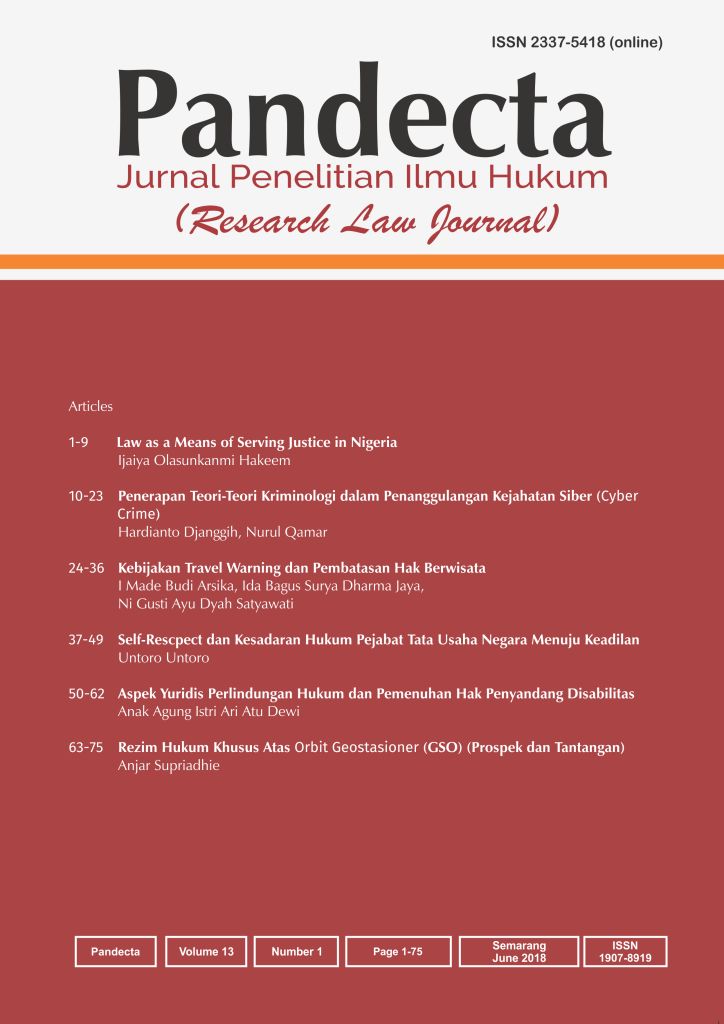Critical Analysis of Application of Article 303 BIS Paragraph (1) to 1 of The Criminal Code in Accessible Cases Online Gambling
(1) Universitas Padjajaran
(2) Universitas Padjajaran
(3) Universitas Padjadjaran
Abstract
Gambling in Indonesia is distinguished into two, ordinary gambling regulated in the Criminal Code and online gambling as stipulated in Law No. 11 of 2008 on Information and Electronic Transactions. Defendant Aan alias Andi committed a crime of online gambling by the way the defendant became an online gambling agent and the defendant was tasked with sharing the access code namely password and ID to the players who wanted to become members of the defendant’s online gambling. The defendant will benefit from the players using the defendant’s access code. The problem that the researchers reviewed relates to the application of Article 303 bis paragraph (1) to 1 of the Criminal Code by the judge on criminal acts making accessible gambling content carried out by defendant Aan alias Andi. Writing these laws using methods approach juridical normative that focused on research on data library. The specification of research that used a descriptive analytical, namely give a description data and carefully as completely as possible about the object of the problem as the result of the study library various literature, legislation, and other ingredients that deals with discussion at in writing the study case. Based on the results of the research, it is known that: First, the judge decided that the defendant Aan namely Andi used Article 303 bis paragraph (1) to 1 of the Criminal Code which was inappropriate because in Article 303 bis paragraph (1) to 1 of the Criminal Code there was no element of making gambling content accessible and making gambling content accessible has been specifically regulated in Article 27 paragraph (2) of the ITE Law. Second, Decision Number 184/Pid.B/2018/PN.Btm does not reflect the objectives of the law, namely justice, certainty and expediency which will have an impact on the weakness of the law enforcement process for the crime of gambling due to the low sentence given by the panel of judges.
Keywords
Full Text:
PDFReferences
Adonara, Firman Floranta. 2015. “Prinsip Kebebasan Hakim Dalam Memutus Perkara Sebagai Amanat Konstitusi.” Jurnal Konstitusi 11, no. No. 2 (Juni): 231.
Atiqah, Dewi. 2022. “Peran Hakim Dalam Mewujudkan Asas Keadilan, Kepastian Hukum Dan Kemanfaatan Putusan.” Http://Pa-Purwodadi.Go.Id/Index.Php/Sub-Bag-Keuangan/Pedoman/26-Halaman-Depan/Artikel/358-Peran-Hakim-Dalam-Mewujudkan-Asas-Keadilan-Kepastian-Hukum-Dan-Kemanfaatan-Putusan. 2 Desember 2022.
Budhijanto, Danrivanto. Cyber Law Dan Revolusi Industri 4.0. Bandung: Logoz, 2019.
Djanggih, Hardianto. 2017. “Pertimbangan Hakim Pada Suatu Putusan Paperadi-lan: Studi Putusan Nomor: 09/PID.PRA/2016/PN. Lwk Tentang Pengentian Penyidikan Tindak Pidana Politik Uang.” Jurnal Penelitian De Jure 17, no. 3 (September): 421.
Djanggih, Hardianto. 2018. “Pertimbangan Hakim Dalam Perkara Pencemaran Nama Baik Melalui Media Sosial.” Jurnal Penelitian Hukum De Jure 18, no. 1 (Maret): 100.
Gainsbury, Sally. Internet Gambling: Current Research Findings and Implication. New York: Springer, 2012.
Gaurifa, Irfan. 2022. “Analisis Yuridis Pertimbangan Hakim Dalam Menjatuhan Hukuman Terhadap Tindak Pidana Perjudian Online.” Jurnal Panah Hukum 1, no. 2 (September): 116.
Gultom, Elistaris, dan Dikdik M. Arief Mansur. Cyber Law Aspek Hukum Teknologi Informasi. Bandung: Refika Aditama, 2009.
Hamzah, Andi. KUHP & KUHAP. Jakarta: Rineka Cipta, 2015.
Harahap, M. Yahya. Pembahasan KUHAP Pemeriksaan Sidang Pengadilan, Band-ing, Kasasi Dan Peninjauan Kembali. Kedua. Jakarta: Rineka Cipta, 2002.
Kalo, Syarifuddin, dan Mahmud Mulyadi. 2018. “Analisis Yuridis Pembuktian Tindak Pidana Judi Online Menurut Undang-Undang Nomor 11 Tahun 2008 Tentang Informasi Dan Transaksi Elektronik.” USU Law Jurnal 6, no. 2 (April): 33.
Kamil, Ahmad. Filsafat Kebebasan Hakim. Jakarta: Kencana Prenada Media Group, 2012.
Kamus Besar Bahasa Indonesia. t.t. “KBBI.” Diakses 17 Januari 2023. https://kbbi.web.id/judi.
Kartono, Kartini. Patologi Sosial. Jakarta: Raja Grafindo Persada, 2001.
Manan, Bagir. Hukum Positif Indonesia. Yogyakarta: UII Press, 2004.
Mertokusumo, Sudikno. Mengenal Hukum Suatu Pengantar. Yogyakarta: Liberty, 2005.
Nasution, Bahder Johan. 2014. “Kajian Filosofis Tentang Konsep Keadilan Dari Pemikiran Klasik Sampai Pemikiran Modern.” Yustitia 3, no. 2 (Agustus): 120–21.
Pahajow, Aan Andrew Johanes. 2016. “Pembuktian Terhadap Kejahatan Dunia Maya Dan Upaya Mengatasinya Menurut Hukum Positif Indonesia.” Lex Crimen 5, no. 2 (Februari): 96.
Prodjodikoro, Wirjono. Asas-Asas Hukum Pidana Di Indonesia. Bandung. Bandung: PT Refika Aditama, 2003.
Rahmayani, Indah. 2019. “Indonesia Raksasa Teknologi Digital.” 5 November 2019. https://kominfo.go.id/content/detail/6095/indonesia-raksasa-teknologi-digital-asia/0/sorotan_media,.
Soesilo, R. Kitab Undang-Undang Hukum Pidana (KUHP) Serta Komentar-Komentarnya Lengkap Pasal Demi Pasal. Bogor: Politeia, 2013.
Suhariyanto, Budi. Tindak Pidana Teknologi Informasi (Cybercrime): Urgensi Pengaturan Dan Celah Hukumnya. Jakarta: Raja Grafindo, 2013.
Syahrani, Riduan. Rangkuman Intisari Ilmu Hukum. Bandung. Bandung: Citra Aditya Bakti, 1999.
Trisnawati, Putri Ayu, dan Abintoro Prakoso. 2015. “Kekuatan Pembuktian Transaksi Elektronik Dalam Tindak Pidana Perjudian Online Dari Perspektif Undang-Undang Nomor 11 Tahun 2008 Tentang Informasi Dan Transaksi El-ektronik (Putusan Nomor 140/Pid.B/2013/PN TB.” Jurnal Ilmu Hukum, 2.
Wiyanta, T, dan Hery Firmansyah. 2011. “Perbedaan Pendapat Dalam Putusan-Putusan Di Pengadilan Negeri Yogyakarta Dan Pengadilan Negeri Sleman.” Mimbar Hukum 23, no. 1 (Februari): 40.
Refbacks
- There are currently no refbacks.


